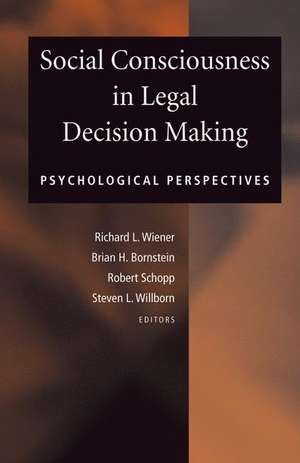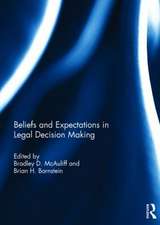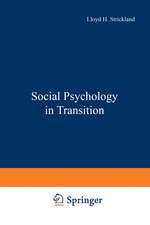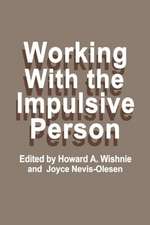Social Consciousness in Legal Decision Making: Psychological Perspectives
Editat de Richard L. Wiener, Brian H. Bornstein, Robert Schopp, Steven L. Willbornen Limba Engleză Hardback – 6 iun 2007
This book's contributing experts raise these critical questions:
- How valid are legal assumptions about human behavior?
- What cognitive processes underlie biased behavior?
- What do personal experience and situational cues contribute to decision making?
- How do individuals’ perceptions of the law influence their judgment?
- Can psychology help legislators write more effective laws?
- Compares rational, descriptive, and normative decision-making models in legal contexts
- Provides important insights into legal decision making by non-specialists (police, administrators, jurors)
- Clarifies and broadens the role of social science in the courts
- Promotes improved dialogue between the field of psychology and law to create a more socially aware jurisprudence.
| Toate formatele și edițiile | Preț | Express |
|---|---|---|
| Paperback (1) | 691.24 lei 6-8 săpt. | |
| Springer Us – 4 noi 2010 | 691.24 lei 6-8 săpt. | |
| Hardback (1) | 644.30 lei 6-8 săpt. | |
| Springer Us – 6 iun 2007 | 644.30 lei 6-8 săpt. |
Preț: 644.30 lei
Preț vechi: 758.01 lei
-15% Nou
Puncte Express: 966
Preț estimativ în valută:
123.28€ • 129.41$ • 102.33£
123.28€ • 129.41$ • 102.33£
Carte tipărită la comandă
Livrare economică 10-24 aprilie
Preluare comenzi: 021 569.72.76
Specificații
ISBN-13: 9780387462172
ISBN-10: 0387462171
Pagini: 281
Ilustrații: XIV, 284 p. 17 illus.
Dimensiuni: 155 x 235 x 19 mm
Greutate: 0.53 kg
Ediția:2007
Editura: Springer Us
Colecția Springer
Locul publicării:New York, NY, United States
ISBN-10: 0387462171
Pagini: 281
Ilustrații: XIV, 284 p. 17 illus.
Dimensiuni: 155 x 235 x 19 mm
Greutate: 0.53 kg
Ediția:2007
Editura: Springer Us
Colecția Springer
Locul publicării:New York, NY, United States
Public țintă
Professional/practitionerCuprins
Law and Everyday Decision Making: Rational, Descriptive, and Normative Models.- Investigative Profiling: Legal Developments and Empirical Research.- The Rhetoric of Racial Profiling.- Racial Profiling, Attributions of Motive, and the Acceptance of Social Authority.- Racial Profiling as a Minority Issue.- Affirmative Action: Legal Developments and Empirical Research.- Affirmative Action and the Courts: From Plessy to Brown to Grutter, and Back?.- The University of Michigan Cases: Social Scientific Studies of Diversity and Fairness.- Social Science in the Courts: The View from Michigan.- Workplace Discrimination: Legal Developments and Empirical Research in Sexual Harassment.- How Can We Make Our Research on Sexual Harassment More Useful in Legal Decision Making?.- Totality of Circumstances in Sexual Harassment Decisions: A Decision-Making Model.- What Can Researchers Tell the Courts, and What Can the Courts Tell Researchers About Sexual Harassment?.- Hate Speech and Hate Crimes: Legal Developments and Empirical Research.- The Hate Crime Project and Its Limitations: Evaluating the Societal Gains and Risk in Bias Crime Law Enforcement.- Implications of Automatic and Controlled Processes in Stereotyping for Hate Crime Perpetration and Litigation Margaret Bull Kovera.- Implicit Bias and Hate Crimes: A Psychological Framework and Critical Race Theory Analysis.- Psychology and Legal Decision Making: Where Should We Go From Here?.
Textul de pe ultima copertă
Our basic assumption about the law is that it is designed to operate fairly and openly. But with human beings as the ultimate decision makers, how do we prevent discrimination within the legal arena, and how does the law decide whether others have behaved in a discriminatory manner? Social Consciousness in Legal Decision Making examines four controversial areas involving people’s perceptions of others—racial profiling, affirmative action, workplace harassment, and hate speech/hate crime—from the perspectives of psychology, decision theory, and the law.
This book's contributing experts raise these critical questions:
This book's contributing experts raise these critical questions:
- How valid are legal assumptions about human behavior?
- What cognitive processes underlie biased behavior?
- What do personal experience and situational cues contribute to decision making?
- How do individuals’ perceptions of the law influence their judgment?
- Can psychology help legislators write more effective laws?
- Compares rational, descriptive, and normative decision-making models in legal contexts
- Provides important insights into legal decision making by non-specialists (police, administrators, jurors)
- Clarifies and broadens the role of social science in the courts
- Promotes improved dialogue between the field of psychology and law to create a more socially aware jurisprudence.
Caracteristici
Consists of four substantive units, each assessing the assumptions that the law makes about human judgement and decision making in a specific area Examines the effects of law on the lives of workers, students, citizens, attorneys, administrators and police investigators A guide to understand the valuable contribution of social scientific research in policy formulation in the law Addresses the role of psychology in substantive law and legal decision making Includes supplementary material: sn.pub/extras



























